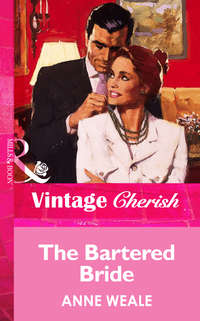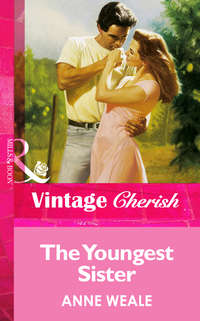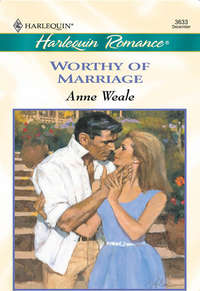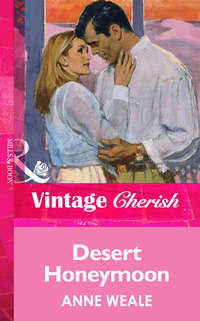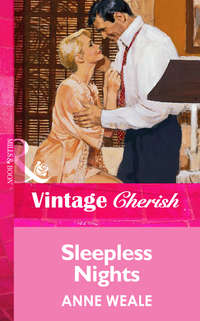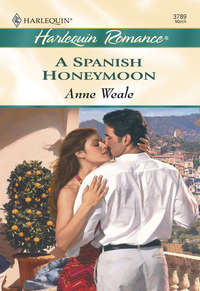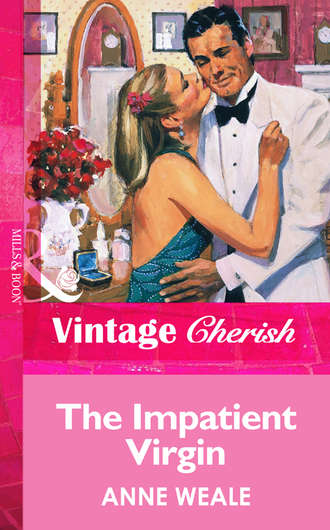
Полная версия
The Impatient Virgin
The fastest route from the airport to Orengo was by the coast road known as the Moyenne Comiche. But Anny didn’t want to join that shuttle of high-speed drivers and long-distance coaches. After Greg’s revelation of who had really set up the interview, she needed time to re-think her plan of action.
All along the city’s famous Promenade des Anglais people in warm-weather clothes were walking their dogs, jogging, or strolling with friends while teenagers on roller-blades glided past them. The palms, the tubs of geraniums, the awnings shading the windows of the hotels made her realise how much, subconsciously, she had missed this Mediterranean atmosphere.
Once this had been her world...
CHAPTER TWO
SINCE the first time Sea Dreams dropped anchor in the quiet bay at the foot of the hill dominated by the dilapidated mansion called Palazzo Orengo, Anny had explored every corner of its neglected garden.
The last remaining gardener, an old Italian, had told Anny’s uncle, the skipper of Sea Dreams, that the garden covered forty-five hectares. There had been a lot to explore. Of all its special places, her favourite was the belvedere with its views of the coasts of two countries, the Italian Riviera to the east and the French Riviera to the west.
The roof of the belvedere was supported by columns of carved rose-pink marble entwined by an old wisteria, veiling the building with its drooping clusters of pale purple flowers.
One hot afternoon, while Uncle Bart was napping in his cabin, Anny sat on the belvedere’s balustrade, interviewing Dona Sofia, the Queen of Spain.
In her imagination, she had interviewed many of the world’s leading women in preparation for the time when she herself would be one of the world’s leading journalists. She had always known what she wanted to be. Journalism was in her blood. Her grandfather had edited a weekly newspaper, her father had been killed reporting a war in Africa and her uncle wrote for the yachting press.
There being no one to hear her except the small lizards which scuttled up and down the columns, she was asking her questions aloud.
‘If you hadn’t been born a princess, Your Majesty, what career would you have chosen?’
Before she could invent the Queen’s reply, from behind her someone said, ‘Who are you?’
The voice gave Anny such a start that she almost fell off the balustrade.
Standing in the entrance to the belvedere was a tall young man she had never set eyes on before. He was wearing a clean white T-shirt and dark blue jeans with brown deck shoes, the kind with a leather thong threaded round the sides. He had the same colouring as the youths in the nearby village, but their eyes were black and his were as blue as his jeans.
‘I’m Anny Howard. Who are you?’
‘Van Carlisle...hi...how’re you doing?’
As she slid off the sun-warmed stone ledge, he came towards her.
As they shook hands, he said, ‘Sorry I startled you. You must be the girl from the schooner down in the bay. Lucio told me about you.’
‘Are you related to Lucio?’
‘No, I’m related to the old lady who lives in the palazzo. She’s my great-grandmother.’
‘I’ve never seen her,’ said Anny. ‘Lucio calls her la contessa. Is she really a countess or is that just his name for her?’
‘It’s her official title, but she was born an American like me. The reason you’ve never seen her is because she’s eighty-three years old and very frail. She stays in bed most of the time.’
‘You don’t sound like an American.’
‘That’s because when I was little my sister and I had an English nanny. My mother is Italian, my father’s American and we lived in Rome until I was about your age. Tell me about you.’
‘I’m an orphan,’ said Anny. ‘But I’m not unhappy like the orphans in books. If I had parents like other people, I’d have to live in a house. I’d much rather live on Sea Dreams with Uncle Bart.’ She looked at her watch. ‘It’s almost time for his tea. Would you like to come down and meet him? He’s a very interesting man. He’s sailed all over the world. I’ve only sailed round the Mediterranean a few times.’
‘I’ve never had much to do with sailing people. Lucio says this isn’t the first time you’ve moored in the bay.’
‘We come here every year. The berthing fees in the marinas keep going up and we can’t afford them,’ Anny confided. ‘So we try to find moorings which are free. There’s a fresh-water tap and a lavatory in the beach house which Lucio says the contessa wouldn’t mind us using. We help him in the garden for as long as we’re here.’
In fact it was only she who helped the aged gardener in his vain attempts to keep Nature under control.
‘How long do you stay?’ Van asked.
‘Two or three weeks, then we’ll sail to Corsica. How long are you here for?’
‘The whole summer vacation. I’m at college in the States. Where do you go to school?’
They had set out down the long path which, bisected by many other paths, wound its way to the beach.
‘I don’t,’ said Anny. ‘Uncle Bart teaches me. We’re doing a special course to make sure I’ll know enough to pass some exams later on. At the moment I’m two years ahead of my age group.’
Van was as tall as her uncle. Looking down at her, he said, ‘How old are you?’
‘Nine and a quarter. How old are you?’
Her answer made him grin. ‘Going on nineteen. What happened to your parents?’
‘My father was a television reporter. He and his cameraman were ambushed by a group of rebels during a war in Africa. That was before I was born. My mother died two years later. I don’t remember her. There was no one else to look after me so Uncle Bart adopted me. The first thing he had to do was to drown-proof me so that if I fell overboard I wouldn’t sink. Are you drown-proof?’
‘I learnt to swim at school. I can’t say I was crazy about it...or anything, except computers. Is your uncle teaching you computer skills?’
When Anny shook her head, Van said, ‘You won’t get far unless you’re computer literate. Maybe I’ll give you some lessons...get you started.’
‘What is the child like?’ asked the old lady propped up by pillows in the great carved and gilded bed. ‘Is she pretty?’
‘Not pretty, but very intelligent. More like thirteen than nine in her conversation. When they go to Corsica, maybe I’ll sail over with them and come back on the ferry.’
‘A splendid idea,’ said the contessa, watching Van wolf down a large helping of pasta. ‘It’s not good to spend all your time riveted to your computer. I’m sure it’s bad for you...hour after hour gazing at a screen.’
His mouth full, her great-grandson gave her a smile with his eyes. Although he was inches taller than her long-dead husband, and still far too thin for his height, there were moments when he reminded her of Giovanni, the irresistibly attractive Italian aristocrat who had come to New York looking for a rich bride to help him restore his ancestral home to its former glory.
Now, sixty-five years later, Orengo was again in decline. Very soon, like other once-great houses, it would be demolished and the site redeveloped as a hotel or blocks of holiday apartments. The thought of it tore at her heart but she could see no alternative.
Van was the only member of the family who ever came here and he was too young to rescue Orengo from the fate of all white elephants. Although several of his American forebears had made fortunes, he was unlikely ever to emulate them. He had a good brain but at present seemed unable to focus on anything but his computer.
Perhaps in twenty years’ time he would be successful at something, but by then it would be too late.
On the morning of her sixteenth birthday, Anny was cooking breakfast in the galley when she heard someone hailing the schooner and went on deck to see Van standing on the beach with a knapsack slung on one shoulder.
Her heart leapt with pleasure. She hadn’t known he was coming and having him to share her birthday celebrations was better than a stack of expensive presents.
‘Watch the pan, will you, Bart?’ she called to her uncle. ‘I’m going to pick up Van.’
By the time the rubber dinghy nudged the shingle at the water’s edge, Van had taken off his shoes in readiness to step aboard.
In the seven years since their first meeting he had changed as much as Anny had. The lanky youth, built like a half-starved dog, all ribs and prominent shoulder bones, had matured into a man with a lean but powerful physique.
Bart claimed some of the credit for this transformation. He had taught Van to crew for him and introduced him to the pleasures of snorkelling and wind-surfing. From being bookish and sedentary, he had changed, at least part of the time, to being an active outdoorsman.
‘Hi! How’s it going?’ he greeted her.
‘Fine. What a great surprise. When did you get here?’
‘Too late last night to come down and say hello. Theodora says you were up at the house yesterday, writing letters for her.’
‘Her hands are so twisted now it hurts her to hold a pen. But I thought she seemed less depressed. Did she know you were coming?’
He shook his head. ‘I saw a special offer on trips to Paris. I have to be back there Thursday so I’ll only be here two nights.’
‘It’s a long way to come for two nights.’
‘I had a special reason. Bart...how are you?’ Looking up from the dinghy as it came alongside, he gave his warm smile to her uncle who had come up on deck to greet him.
It wasn’t till they were aboard and the two men had greeted each other that Van turned back to Anny. ‘Happy birthday.’ He bent his tall head to kiss her lightly on both cheeks.
Anny felt herself blushing. Kisses weren’t part of her life. Bart was kind, but he wasn’t demonstrative. Even when she was little he had never kissed her goodnight. Affectionate pats on the head or shoulder and, occasionally, a brief cuddle if she had hurt herself was his limit on physical expressions of the close bond between them.
Immediately after kissing her, Van started to delve in his knapsack, missing her reaction to the touch of his lips.
‘A little something for the skipper...’ he handed over a bottle in an airline bag ‘...and some bits and pieces for the first mate.’
The parcels he handed to her were all beautifully wrapped. Some of the ribbon adornments had become crushed in transit but were soon tweaked back into shape by Anny’s appreciative fingers.
While Bart went below for a glass to sample his present, she began to unwrap hers, carefully peeling away the bits of sticky tape so as not to damage the lovely paper.
Members of Van’s family whom she knew only by name had sent a swimsuit, a calculator, a backpack-style bag, a pen as thick as a cigar, a belt with a silver buckle and a couple of cassettes for the head-set he had given her for her thirteenth birthday. All the presents had cards attached to them with messages like—To Giovanni’s mermaid with birthday wishes from Cousin Kate.
The parcel tagged with his handwriting she kept till last. It looked and felt like a heavy book, perhaps an anthology of American poetry. He knew she loved poetry.
‘You’ll have to give me the addresses of all these kind people. I must write and thank them.’
‘Postcards will do. You can buy some in Nice this afternoon.’
‘Why are we going to Nice?’
‘Wait and see.’
When Van looked at her with that glint of laughter in his eyes, it gave Anny a funny feeling in the pit of her stomach. She had felt it a few times before, like a butterfly fluttering inside her. Today it was stronger, more disturbing.
She read the card on his parcel. The message was short and factual. To Anny from Giovanni. With the date.
‘Why not “from Van”?’ she asked.
‘Because that’s my proper name. When I’m rich and famous I’ll be Giovanni Carlisle to the world and Van to my family and friends. You won’t use Anny for your byline, will you? I thought when you started your career you’d change to Annette Howard.’
‘I like Anny better. It’s what I’ve always been—’ She broke off as, instead of the expected book jacket, she exposed a grey plastic box.
‘What’s that you’ve brought her?’ asked Bart, reappearing with a bottle of whisky in one hand and two tumblers in the other. ‘Will you join me?’
‘Not right now, thanks. It’s a laptop computer for Anny to write her stuff on,’ Van told him. ‘That’s a great old typewriter you use, but it’s a museum piece. This—’ he tapped the lid of the laptop ‘—isn’t state-of-the-art, but it’s OK for entry level.’
Anny was overwhelmed. Because it was important to Van, she had looked at computer equipment the last time they were in a place with a shop which sold it. The prices had seemed exorbitant.
Although Van’s father had an important job in the American foreign service and his mother’s second husband had factories near Milan connected with the booming Italian fashion industry, Van did not seem to share in his parents’ prosperity. He had been expensively educated, but from things he’d let drop, it sounded as if what he was paid for his job as a computer programmer didn’t leave him much spare cash after he had paid his overheads.
‘Look, here’s how you do it.’ He showed her.
Watching the screen inside the lid come to life, she said, ‘It’s wonderful, but you shouldn’t have given me such an expensive present.’
‘I got it cheap from a guy who was upgrading. Later I’ll give you a tutorial. Right now, how about breakfast?’
‘Oh, my goodness...the ham.’ She handed the laptop to him and hurried back to the galley.
Later they swam. Although here, in late April, the air temperature was already that of midsummer in northern Europe, when they dived from the deck, for the first few moments under water the sea felt breathtakingly cold. Bart never swam till June, sometimes not till July when the water was as warm as consommé.
Their bodies adjusting rapidly, they struck out to a group of rocks which offered places to sit.
‘Why does your cousin Kate call me “Giovanni’s mermaid”?’ Anny asked, twisting her hair into a skein and squeezing the water from it
‘Once, when we were watching you swimming, Bart said you were the nearest thing to a mermaid I’d ever see. I must have told Kate that. Aah, this feels good.’
As he stretched out on the warm rock, his olive-skinned torso beaded with bright crystal drops, Anny felt another secret flutter. This time his stay was too short for him to tan deeply as he had when crewing.
‘Will you come sailing this summer?’
‘I don’t think so.’
It hurt her that he didn’t sound as disappointed as she felt. ‘Why not?’
‘Lack of time mainly. My collegiate life is over.’
After graduating summa cum laude—the equivalent of a first-class honours degree—he had gone on to do two years of post-graduate work.
‘I’m part of the rat race now...as you will be pretty soon. Enjoy all this while you can. It won’t last for ever.’
‘I don’t want to stay here for ever. It gets boring going round the same places year after year. I want to see Paris and London. But I worry about leaving Bart. I’m not sure he’ll feed himself properly if I’m not around. He taught me to cook but he doesn’t do much himself now.’
Van pulled his shoulders off the rock with the stomach muscles developed while mastering wind-surfing.
‘You probably thought it wasn’t such a good idea to bring him a bottle of booze. But Scotch is better for his liver than cheap plonk full of chemicals.’
Anny sighed. ‘He drinks too much because he’s lonely. An adopted daughter isn’t the same as a wife. He was in love with someone a long time ago. But she wouldn’t live on a boat and he knew the sea was in his blood. Imagine having to choose between the person you love and the only thing you want to do. It must have been awful...for both of them.’
‘Forty years ago most women followed their men to wherever they had to go...darkest Africa... Patagonia...anywhere,’ said Van. ‘Sounds as if she wasn’t really in love with him.’
‘Or she may have known she couldn’t cope. I’ve never been used to anything else so it doesn’t seem strange to me. But it could be a difficult adjustment for someone brought up ashore.’
‘An adjustment you’ll have to make the other way round,’ said Van. ‘I wonder if you’ll like big cities as much as you think.’
‘Nice is a big city.’
‘Nice has the sea on its doorstep. It’s a village compared with Paris and London. Where I want to live is right here. But Orengo needs money spent on it...lots of money...the kind of money Theodora had when she came here.’
It was at his great-grandmother’s wish that he used her first name.
‘What happened to her money?’ Until now Anny had never liked to enquire.
‘The old boy blew most of it. They lived in tremendous style. There were fifteen gardeners and eighteen household staff. They entertained all the great names of their era, the Thirties.’
‘Will you do that when you live here?’ There was no doubt in Anny’s mind that one day Van would be rich and famous.
‘I shan’t have thirty-three people on my payroll, that’s for sure.’ He looked at his waterproof watch. ‘It’s time we were getting back. Theodora wants to see you.’
He sprang up, holding out a hand to give Anny a pull-up. Their hands were only clasped for a few seconds, but the strength in his fingers, and the bulge of muscle in his upper arm as he lifted her to her feet with no effort on her part, reanimated the feelings she had had earlier.
Poised on the edge of the rocks three metres above the pellucid sea, they both inhaled a deep breath. In the first year or two of their friendship, this was a game Anny had always won. In those days she could hold her breath longer and swim further without tiring. Now the propulsion of Van’s long, muscular thighs made him enter the water half a metre ahead of her, increasing his lead as they glided through the sunlit sea.
When Anny came up, gasping, he was still under the surface. She was swimming flat out when his dark head appeared, but he reached the schooner’s ladder lengths ahead of her.
‘It’s time you had a handicap,’ she said, as she stepped on deck with Van coming up behind her. ‘You may not get as much practice, but you’re so much taller and stronger.’
‘OK, next time I’ll give you a five-second start.’ For a moment his blue eyes appraised her slender body in the new American swimsuit which had higher-cut legs and a more revealing top than her old suit.
Brief as it was, the look made her heart do a flip. Then Van turned away to pick up the towel he’d brought rolled round his brief black bathing slip.
Theodora di Bachelli was not in bed but sitting in a chair on the bedroom’s awning-shaded balcony when Anny and Van entered her room.
‘Many, many happy returns of the day, my dear child,’ she said, holding out hands which now bore little resemblance to the bronze cast, made by an artist when she was twenty, on one of the tables in the shuttered salon.
‘Thank you.’ Anny bent to kiss the chamois-soft powdered cheeks.
‘It’s high time you had a dress,’ said the contessa. ‘As I can’t come to help you choose it, Van will deputise for me. You can wear it tonight when you and your uncle dine here.’
‘Uncle Bart hasn’t any formal clothes,’ said Anny. She had no intention of leaving him to eat alone.
‘Neither has Van. Only you and I will dress up. I haven’t dressed up for twenty years, but I shall tonight. A girl’s sixteenth birthday is a special occasion. Imagine, I was only two years older than you when I married. My husband was twenty-five, the same age as his great-grandson.’ After glancing at Van, she went on, ‘But in those days well-bred young men in their twenties spent their time sowing their wild oats. Do you understand that expression?’
‘It means having love affairs, doesn’t it?’ Anny replied.
‘Love affairs of a nature which might be condoned by their fathers but were not approved of by their mothers—if they knew about them,’ said the contessa. ‘Young men would also get drunk and, if they were very wild, smoke opium. As the French say, the more things change, the more they remain the same. The only difference between my time and your time is that now many good girls do what once only bad girls did and drugs are on sale everywhere.’
Van said dryly, ‘We’re not all doing drugs, Theodora.’
‘I’m sure you have too much intelligence to jeopardise your future. Your only excess, that I know of, is straining your eyes, doing whatever it is that you do on that machine you installed in the tower room.’
She turned back to Anny. ‘You, my dear, have had the good luck not to be exposed to bad influences. I hope you will always stay as unspoiled and lovely as you are today. If I were your fairy godmother, I would use my magic to make sure that when you are a little older you will fall in love and stay in love for the rest of your life. It doesn’t happen very often, but it did to me and I hope it will to you.’
‘Thank you, Contessa...and thank you for the dress.’
It was the prospect of going shopping with Van, rather than the dress itself, that made Anny’s eyes sparkle.
‘Why do the rest of your family never come here?’ she asked, on the train which ran from a station near the palazzo to Nice, sometimes snaking into tunnels where the mountains came down to the sea and re-emerging into the sunlight above bays where the clear water showed where the sea-bed was sandy and where it was covered with dark green weed.
‘They couldn’t very well come here and not stay at Orengo. By their standards it’s falling to bits,’ Van told her. ‘Americans are accustomed to a higher level of comfort than any other nation. They had central heating and showers decades before Europeans. They don’t like insects and draughts and damp-smelling closets. Orengo is stuck in a time warp. It was the height of luxury in its day, but that was a long time ago.’
‘You like it. You’re American.’
‘Not really. Do you know the expression “a citizen of the world”?’
Anny shook her head. Bart had bought her a set of encyclopaedia, but it was out of date by twenty years. As they only ever saw newspapers and magazines which other people had discarded, sometimes there were embarrassing gaps in her general knowledge.
‘It means someone who feels they belong to the human race rather than to any one country,’ he explained. ‘I go a step further. I feel I belong to cyberspace. Right now it’s like the old Wild West...unexplored territory. But one day...’
As he explained his vision, Anny listened intently, as she did to everything Van said. But a lot of it was beyond her comprehension. She wondered if there was a book on the subject she could study before his next visit.
‘If this were New York we could go to Bloomie’s, but here I wouldn’t know which is the best store,’ said Van, on arrival at Nice.
‘That’s no problem,’ said Anny. ‘Let’s have a drink in one of the cafés and when I see someone going past who looks the way I’d like to look, I’ll ask her where she shops.’
The suggestion seemed to amuse him. ‘Do you really have the nerve to do that?’
‘Why not? It’s common sense. Who minds being told you like the way they look? Anyway I can’t afford to be shy if I’m going to be a journalist. I’ll have to persuade other people not to be shy with me.’
They chose a café in one of the pedestrianised shopping streets near the western end of the spacious Place Massena with its public gardens and fountains.
Presently, while she sipped a soft drink and Van had a beer, she saw a couple of girls a little older than herself whose style she wanted to emulate. Flattered by her explanation, they were only too ready to list their favourite shops.
‘There...you see? One easy movement,’ said Anny, returning to their table outside Le Paradis.
‘You should have offered to buy them a drink,’ said Van. ‘The one in blue had excellent legs.’
The remark sapped all Anny’s pleasure in the success of her strategy. She felt furious with him.


